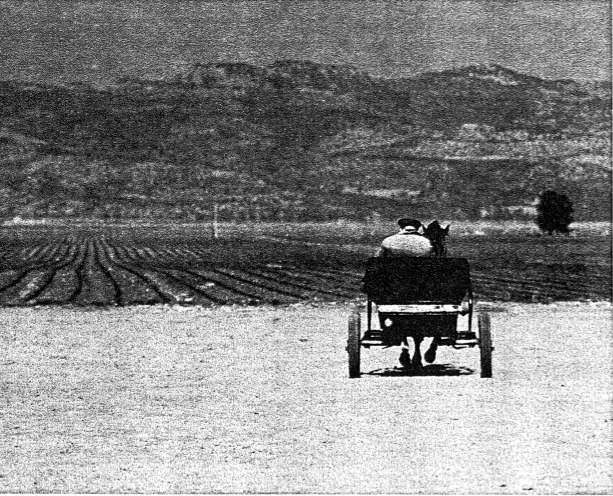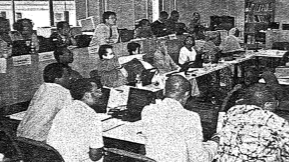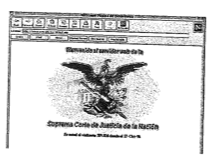The Internet and Latin America
Looking into the Future, Preserving the Past

A Mennoite bishop in Chihuahua, Mexico still uses his horse-drawn wagon to go to and from church. The Internet’s technology can be sued to preserve traditions and link us all.
This issue of the DRCLAS News is devoted to the Internet’s effect on Latin America. As the person in charge of all Harvard News Office Web sites and the editor of a daily newspaper produced in May 1998 for the Second International Harvard Conference on the Internet and Society, I thought that I knew a lot about the ways in which people use the Internet. But even I was a little surprised when a journalist friend, visiting recently from Colombia, sat down at my computer and called up press releases from the Fuerzas Armadas Revolucionarias de Colombia, or FARC – Colombia’s largest guerrilla group and one of Latin America’s most feared and most successful Marxist movements.
My friend explained that all the armed combatants in Colombia now have Web sites, and some, like the FARC, in addition to posting communiqués online, have incorporated “push technology” to send press releases via e-mail to interested parties, such as journalists. The FARC’s e-mail distribution system, in fact, works very much the same as the online shopping service I’ve signed up for through Amazon.com to be notified about new books.
Since the Internet is a revolution, it should come as no surprise that revolutionaries use the Internet. But as the stories in this issue of the DRCLAS News show, the nature of the Internet makes all of us revolutionaries. Tim Stumph, the Information Technology Coordinator for the DRCLAS, found a new job and a new career with the Web, as he recalls in his article. But it is not an exaggeration to say that we all have new jobs and new careers because of the Internet, whether we have recognized that yet or not. We are living at the dawn of an age of information the like of which has not been seen since Gutenberg revolutionized the world by revolutionizing the printing press.
The writers who have contributed to this newsletter have looked thoughtfully into the future and brought us back a vision – not just a vision of a bridge to the 21st century, but what we can expect to find once we’ve crossed that bridge. But the writers’ intent goes much further than fortune-telling: as Juan EnrÃquez suggests, the Internet we wake up to in the future is dependent upon the Internet we envision now; the questions of access are much more than infrastructure concerns, but are moral concerns, as Debora L. Spar argues in her essay “The Public Face of Cyberspace: The Internet as a Public Good.”
Straddling two ages, as we are – the Age of the Internet and the Age Before the Internet – means that we face a world of contradictions. For example: though the Internet is a form of mass communication that crosses national borders as though they did not exist, it is largely inaccessible to the masses in many countries, and especially Latin American countries, as Juan EnrÃquez points out in his article. Though “cybercafes” offer Internet access throughout Latin America, as correspondent Madanmohan Rao reports, the cybercafes mostly are used by wealthy tourists, while, as Enríquez points out, “Chile and Argentina have about a third fewer telephones per capita than the U.S.; Brazil, Mexico and Venezuela around one sixth less” – and no phones means no Internet access.
Many of the new dilemmas discovered by looking at the Internet are really the same old problems brought forward into a new age, as Harvard Law Professor Lawrence Lessig declared in his keynote speech at the Conference on Internet Governance at MIT in October, “There isn’t a special set of dilemmas that cyberspace will present, just the familiar dilemmas that modern governance confronts: familiar problems in a new place.”
Yet, as Deborah Hurley discusses in her article about security, secrecy and civil liberties on the Web, the sheer power of the Internet as a communication tool increases the stakes considerably. “For most of mankind’s existence,” Hurley writes, “communication was, of necessity, evanescent. Now, and into the future, as more and more interactions take place over various information media, a greater proportion of communications are, and will be, recorded and recordable. They will be more durable and much easier to duplicate and distribute than ever before.” As a classic horror movie slogan declared, “In space, no one can hear you scream.” But it is even scarier to realize that in cyberspace, everyone can hear you whisper.
So it seems that society as a whole should consider the Internet with a great deal of caution, while individuals and groups continue to find ever-more-amazing ways to use this powerful new communications vehicle. An innovative program based at the School of Public Health, for instance, is giving women in Latin America, and women around the world, access to important information about reproductive health and rights. As Anita Harris’s story describes it, “The Global Reproductive Health Forum at http://www.hsph.harvard.edu/Organizations/healthnet supports a number of easy-to-access, interactive information services, including e-mail discussion groups, electronic journals, and on-line conferences.” Who among us could have imagined such a powerful system even a few years ago?
But, to look into the future, one can imagine even more powerful systems that bring us all closer together. Welcome to a much smaller world – a world where we all, no matter our politics, are revolutionaries.
Winter 1999
John Lenger is assistant director and editor-in-chief of the Harvard University News Office. He has visited Colombia twice recently.
Related Articles
The Public Face of Cyberspace
Imagine a network that spans the world. A network that delivers — invisibly and inexpensively — the myriad bits of information that will undeniably be the key to prosperity in the 21st century…
Policy Makers
When Jeanette Dubois arrived in Cambridge from Grenada on a sunny day in June to attend a five-week workshop on education policy, little did she know that she would be embarking on…
Latin American Governments Plug In
Confused about where to get info on the latest legislation in Mexico or presidential speech in Chile, aggregated census data in Colombia or a chronology of the peace commission in…




